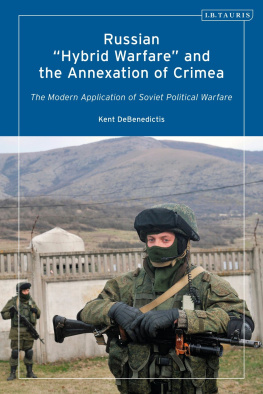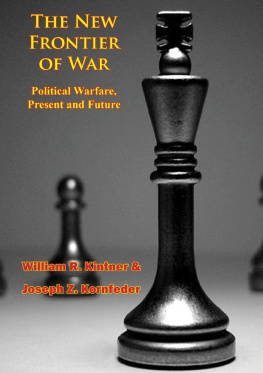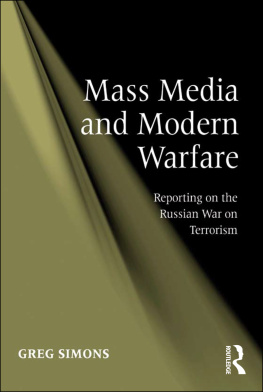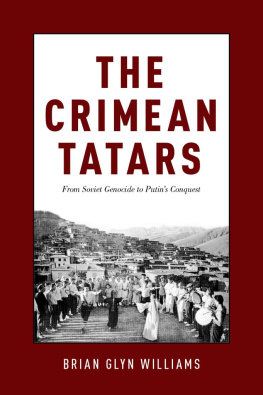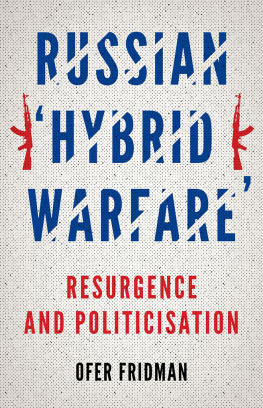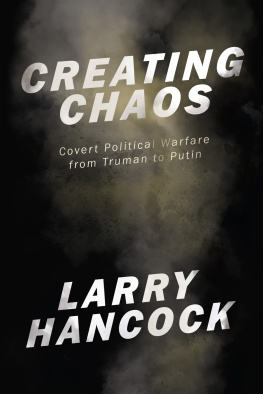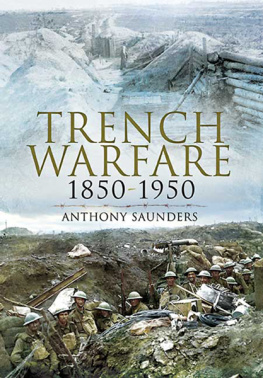A very timely, relevant, and important book with a compelling explanation of the true nature of Russias hybrid warfare, including eye-opening details of the lengths Russia went to orchestrate the 2014 annexation of Crimea, as well as illuminating examinations of earlier actions that offer insights, as well. DeBenedictis establishes convincingly that Russian hybrid warfare is best understood as the modern application of traditional Soviet political warfare practices, such as active measures, maskirovka , and disinformation and such understanding is critical in the contemporary era of renewed great power rivalries. General David Petraeus, US Army (Ret.), former commander of the Surge in Iraq, US Central Command, and Coalition Forces in Afghanistan and former director of the CIA .
A brilliant analysis of modern war by a young, yet seasoned, Army leader. Kent DeBenedictis thoughtfully dissects the hybrid warfare conducted by the Russians in Ukraine and shows that while it is explosively effective, it is not new to Russian strategy, or to warfare in general. Success, even survival, may depend on our ability to both understand, and to master it. General Stan McChrystal, US Army (Ret.), former commander of Coalition Forces in Afghanistan and Joint Special Operations Command .
This is a timely and highly relevant analysis that deserves careful consideration by all those who intend to commentate on the threat. General Sir Nick Parker , UK advisor to the Ukrainian minister of defence 201619 .
Why does the West keep getting surprised by Russia? Partly, it is because we do not use the past properly to understand the future, and this impressively researched study precisely addresses that, placing the 2014 seizure of Crimea in the context of Moscows past adventures, an exercise of value to scholars and policy-makers alike. Prof Mark Galeotti , author of We Need to Talk About Putin: How the West Gets Him Wrong.
This excellent new book makes a valuable contribution to our understanding of Russian political warfare, challenging existing assumptions and prevailing narratives. Extensively researched, it reveals continuities between historical Soviet political warfare practices and Russias 2014 intervention in Crimea. Dr Tracey German , Kings College London .
The views expressed in this book are those of the author and do not necessarily represent the views of the US Army, the Department of Defense or the US government.
To my Brothers and Sisters in Arms
Russian Hybrid Warfare and the Annexation of Crimea
The Modern Application of Soviet Political Warfare
Kent DeBenedictis
Contents
Gerasimovs characterization of the colour revolution mode |
Graphic identifying the colour revolutions from General Gerasimovs presentation at the Russian Ministry of Defences Third Moscow Conference on International Security, 23 May 2014 |
Photograph of a Soviet soldier with a Czechoslovak girl during the Prague Spring |
Monument of a Russian soldier debuted in Belogorsk, Russia, on 6 May 2015 |
Little green men outside the Ukrainian military installation in Perevalne, Crimea on 4 March 2014 |
When I was appointed to serve as the US Senior Defence Advisor to Ukraine in 2016 by Secretary of Defence Ash Carter, I read everything I could about the country. I studied Ukraines rich history to understand how historical shifts in this borderland state impacted politics, culture and the economy in the present. But I was especially interested in studying Russias annexation of Crimea and its support to separatists in Ukraines eastern oblasts of Donetsk and Luhansk, collectively referred to as the Donbas.
Ukraines military had atrophied since the end of the Cold War. What had once been one of the largest militaries in the world was a shell of its former self by 2014. Considering an attack by Russia unfathomable, Ukraine was completely unprepared for Russias seizure of Crimea and its support to separatists in its east. Ukraine recognized that it needed to overhaul its military, prompting Ukrainian president Petro Poroshenko to ask for senior defence advisors from the United States, the United Kingdom, Canada, Lithuania, Poland and Germany to help his country reform its defence establishment. I was the first to arrive in October 2016 with my counterparts arriving over the next several months. Together with this remarkable team the Defence Reform Advisory Board we worked to provide the young nation with a more effective defence establishment.
Over the next two years, beyond many meetings with President Poroshenko, Minister of Defence Stepan Poltorak and Chief of Defence Viktor Muzhenko, we met with hundreds of officers, ranging from senior generals within their ministry to young officers at the front, conducting training for their Armys second Special Forces Qualification Course and at their national training centre in Yavoriv. We also met with elected officials from the Verkhovna Rada; officials from the defence sector, United Nations and the Organization for Security Co-operation in Europe; volunteers; and other government and non-government officials.
From our first trip to see the troops in their defensive positions in the Donbas, it was clear to see the enormity of the task at hand. Ukraine was attempting to conduct a massive defence reform, in short order, while fighting a war with a large number of forces in defensive positions along the front. As the commander of US Central Command, I witnessed my own military attempt reform on a much smaller scale while fighting wars in Afghanistan and Iraq, so I appreciated their challenge.
To help support and advise our Ukrainian partners, we strove to understand the nature of the 2014 Russian invasion. The world was shocked by Russias bold and illegal, although brilliantly executed, seizure of Crimea. Less than thirty days after Ukrainian president Viktor Yanukovych fled Ukraine, Russia had successfully annexed Crimea with almost no blood shed and with little real opposition from the international community. In its immediate aftermath, the military operation was studied in great detail by militaries around the world. Many attributed Russias success to a new model of war, termed Russian new-generation warfare by some and Russian hybrid warfare by others. While these accounts were useful in my preparation as senior defence advisor, they often failed to truly explain what we were seeing or the context of Russias actions.
I wish that this book, with its insightful study of Russian hybrid warfare and the 2014 annexation, would have been written prior to my experience in Ukraine. Kent DeBenedictis takes an entirely new approach to analysing Russias seizure of Crimea. Despite being an Army Officer, he analyses the operation not strictly from a military lens but instead through the lens of Soviet political warfare. This unique perspective offers some interesting insights. When comparing Crimea to previous Soviet invasions, DeBenedictis finds that rather than being part of a new form of warfare, instead, it is more of a replay, or twenty-first-century version, of what the Soviet Union did throughout its history, especially in Czechoslovakia in 1968 and Afghanistan in 1979.
While Russias strategy of political warfare may not be new, a study of its tactics in the Donbas sheds light on what war with a modern state in the twenty-first century might look like. Just as studies of Israels Six-Day War in 1967 contributed to the development of the US Armys AirLand Battle doctrine that was so effective in the 1991 Gulf War, this conflict needs to be studied to develop the best doctrine given current technologies. Russias use of drones, electronic warfare, proxy warfare, information warfare and cyber warfare combined with lethal measures of massed artillery, armour and anti-tanks capabilities offer important lessons.


